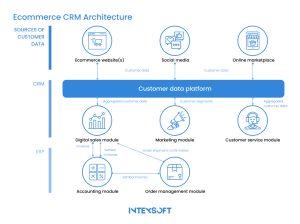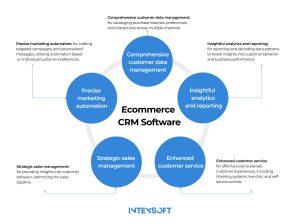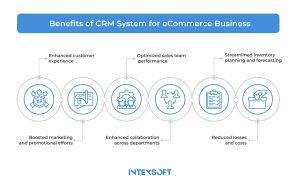
The post gathers a collection of high-quality CRM and website integration solutions designed specifically for ecommerce businesses. It examines these solutions’ features, covering everything from handling customer relationships to refining sales processes and improving customer service experiences. Need advice on CRM ecommerce integration strategies? Reach out to us anytime.
Reading time: 15 min.
Staying on top of customer demands and aspirations, no matter the size of your business is quite a challenge. Yet, there is a game-changing solution: the right ecommerce CRM system as a secret weapon in handling customer relationships.
CRM systems are not just necessary; they are game-changers. Imagine effortless CRM integration with your ecommerce platform as the key to fueling your online enterprise’s success.
IntexSoft will uncover powerful CRM integrations explicitly designed for online stores through this post.
Let’s get started.
Ecommerce CRM software serves as the digital nerve center for online businesses, optimizing every aspect of customer relationships. The tech-powered solution gathers and refines customer data, turning it into actionable insights that business owners can use to make businesses thrive.

This specialized software is a powerhouse equipped with significant features:

Initially, CRM integration empowers businesses to collect customer data from diverse sources, constructing a complete picture of each customer’s preferences, habits, and interactions. This comprehensive understanding is the groundwork for personalized marketing campaigns, tailored product recommendations, and enhanced customer service. Ultimately, it leads to elevating the overall customer experience.
Additionally, blending CRM with ecommerce platforms streamlines how things work. It lets businesses easily track customer interactions, handle sales pipelines more effectively, and predict future trends by analyzing what customers buy and how they behave.
Plus, CRM integration helps foster customer loyalty by letting businesses reach out at the right moments and through the proper channels.It creates opportunities to reach out before customers even ask, making sure they feel appreciated and heard, encouraging their return.
In essence, this digital partner helps businesses improve customer happiness, increase loyalty, and grow sales by customizing interactions and offerings to fit each customer’s individual journey.

When CRM blends into ecommerce platforms, it sets the stage for a personalized and smooth ride for customers. Bringing together data from different points, businesses get a full view of what customers like and how they act. This info powers customized interactions, making customers happier and more loyal.
CRM integration hands businesses the tools to create spot-on marketing campaigns and personalized promos. By tapping into customer insights from all their data, companies can target their audience better, score higher conversion rates, and make the most of their marketing spending.
CRM integration opens up a treasure trove of customer info for sales teams. It helps them get what customers want, nurture leads better, and improve the whole sales gig. What’s the payoff? Things run smoother, conversions improve, and the cash flow increases.
CRM integration makes talking and sharing info between different teams a breeze. Marketing, sales, customer service, and inventory folks all get to use the same data. This helps everyone work together better, aiming for the same targets and goals.
Integrating CRM with inventory systems enables businesses to forecast demand accurately. Companies can optimize inventory levels by analyzing customer purchase patterns and preferences, reducing overstocking or stockouts, thereby minimizing costs and maximizing revenue.
Businesses can identify inefficiencies and areas for improvement through data-driven insights from CRM integration. By streamlining processes, optimizing resources, and minimizing errors, companies can reduce losses and operational costs, ultimately boosting profitability.
Blending data from different sources can create inconsistencies or duplications. Maintaining data accuracy becomes a puzzle, impacting decision-making reliability.
Bridging CRM systems with existing platforms or databases involves a complex mix of technologies and data structures. Compatibility issues and technical intricacies demand significant time and resources for seamless integration.
The financial investment in CRM integration spans software licenses, customization, and ongoing maintenance costs. Allocating these resources poses a challenge for businesses.
Employees’ hesitation or discomfort with adopting new systems or revised workflows is a significant challenge. Convincing and training staff on the benefits of CRM integration is vital for smooth adoption.
Sharing sensitive customer data across integrated systems raises security threats. Ensuring data encryption, regulatory compliance, and robust cybersecurity measures becomes critical.
It is complex to customize CRM integration to fit specific needs while ensuring it can scale for future growth. Businesses must ensure that integrated systems can evolve without significant overhauls.
Adapting to new workflows and organizational changes from CRM integration can be tricky. Aligning departments and processes to the integrated system requires a shift in mindset and might face resistance.
Here is a table outlining the different CRM types and their relevance to ecommerce:
CRM types
| CRM type | Description | Relevance to ecommerce |
| Operational | Handles day-to-day customer interactions, such as marketing, sales and service-related tasks. | Guarantees smooth handling of orders, precise targeting in marketing campaigns, and responsive customer service for a smooth customer journey in online transactions. |
| Analytical | Analyzes customer data to derive insights and patterns in behaviors and preferences. | Drives personalized marketing strategies and tailored recommendations and refines the online shopping experience based on deep customer insights. |
| Collaborative | Facilitates collaboration between different departments to serve customers more effectively. | Encourages unified collaboration among sales, marketing, and customer service teams, fostering consistency in delivering customer experiences. |
| Strategic | Syncs CRM strategies with wider business aims and customer-centered long-term objectives. | Utilizes data to forecast trends, plan product offerings, and design strategies driving growth and expansion. |
These CRM types serve as distinct tools, each fulfilling a specific role while contributing to the overall objective of enhancing user experiences. You know that operational CRM keeps operations smooth, analytical CRM unlocks insights, collaborative CRM promotes teamwork, and strategic CRM guides future-oriented decisions. Leveraging these diverse CRM types enables online businesses to stay adaptable.
| CRM Solution | Description | Key Features |
| Salesforce | A well-known CRM system with robust ecommerce integration capabilities and comprehensive sales and marketing tools. | – Advanced customization. – Sales and marketing automation. – Strong ecommerce integration. |
| HubSpot CRM | CRM with a focus on inbound marketing. It provides seamless integration with ecommerce platforms and offers a diversity of tools. | – Inbound marketing tools. – Ecommerce integration. – Additional marketing and sales possibilities. – Automation of customer services. |
| Zoho CRM | A suite of business applications, including CRM, focuses on providing affordable and scalable solutions for medium-sized stores. Small enterprises will also appreciate this software. | – Affordable pricing. – Scalability. – Ecommerce features. |
| Microsoft Dynamics 365 | An integrated suite of business applications that includes CRM and ERP tools. It is suitable for businesses looking for comprehensive integration across various operations. | – CRM and ERP integration. – Scalable and customizable. – Business intelligence and analytics. |
| Shopify | A top ecommerce platform offering a built-in CRM system took the world by storm. There are an array of advantages of using Shopify for ecommerce store development. It is known for its simplicity and ease of use, making it a wise solution for small or medium online stores. | – Ecommerce functionality. – Friendly interface. – Integrated payment options. |
| WooCommerce | A WordPress plugin that turns websites into fully functional enterprises. It provides various extensions and plugins for CRM integration. | – WordPress integration. – Customization through plugins. – Ecommerce features. |
| Magento | An open-source ecommerce software that offers flexibility and scalability. It can be integrated with various CRM systems for effective customer relationship management. | – Open-source flexibility. – Scalability. – Third-party integrations for CRM. |
Start by defining your business goals regarding the use of CRM software. What are the areas that need improvement the most? Is it the retention rates of customers? Target marketing campaigns? Optimizing processes? Data visibility or something else? Figure this out. By knowing prime goals, your company will keep moving forward with a clear vision of the destination point and fulfill its quest.
Now, you can choose platforms with features aligning with your goals and current workflows. However, remember that some solutions may result in unnecessary expenses in the future. That’s why it’s essential to look for platforms that permit advancements to more sophisticated plans as your business expands.
Once you’ve narrowed down your options, check out demo videos. You can also schedule demonstrations with key CRM providers. This allows you to get a feel for all the important aspects. Are the interfaces convenient for end-users? Is the design modern? Could customers face difficulties using the website? Assess these aspects early on. Remember, choosing vendors offering free training and 24/7 support is always a wise decision.
Your ecommerce ecosystem should be integrated. What does it mean? Components and elements within your ecommerce framework are interconnected and work together without serious pitfalls. CRM systems have to support the third-party integrations you need. Only this way can your business truly spread its wings.
Do the CRMs you’re considering offer packages that fit your needs regarding users, features, and connectors? Determine your budget to answer this question and act in the right direction.
Test out the free trials CRM platforms provide before reaching a final decision. This way, you can assess how the solution appeals to your actual business processes.
In this handbook, we explore the vital field of Ecommerce CRM integration. To learn more, check out our blog. There are many articles about Shopify and Magento, including detailed information on migration that is currently being discussed. But what’s the smartest way to do it? Contact our experts to get a free consultation. Let’s find ways to keep your business updated with the latest technologies. Leverage them to boost your profits.